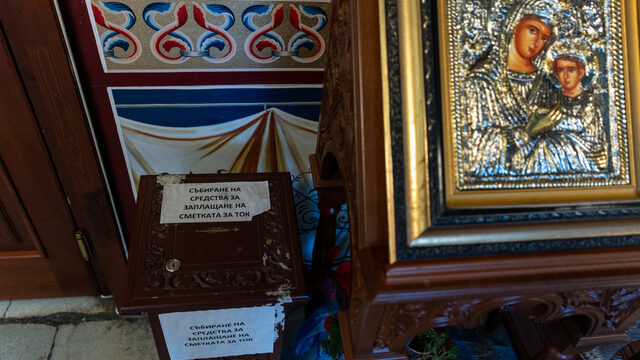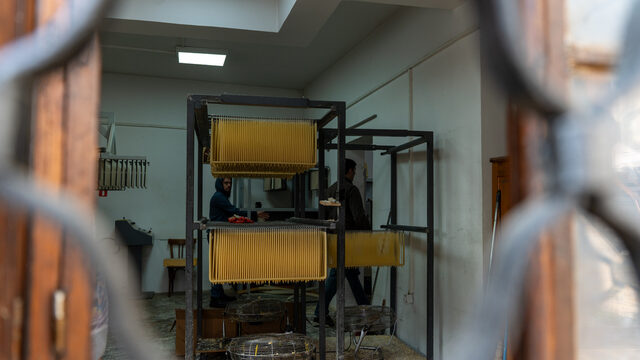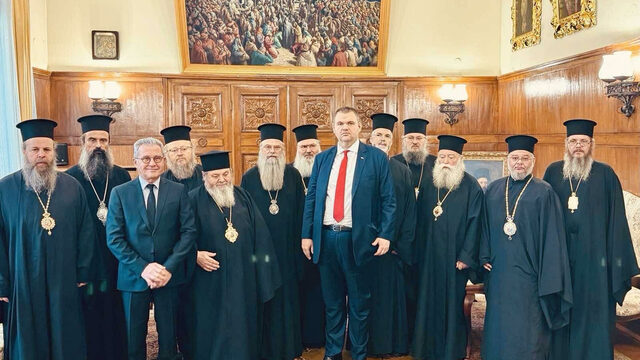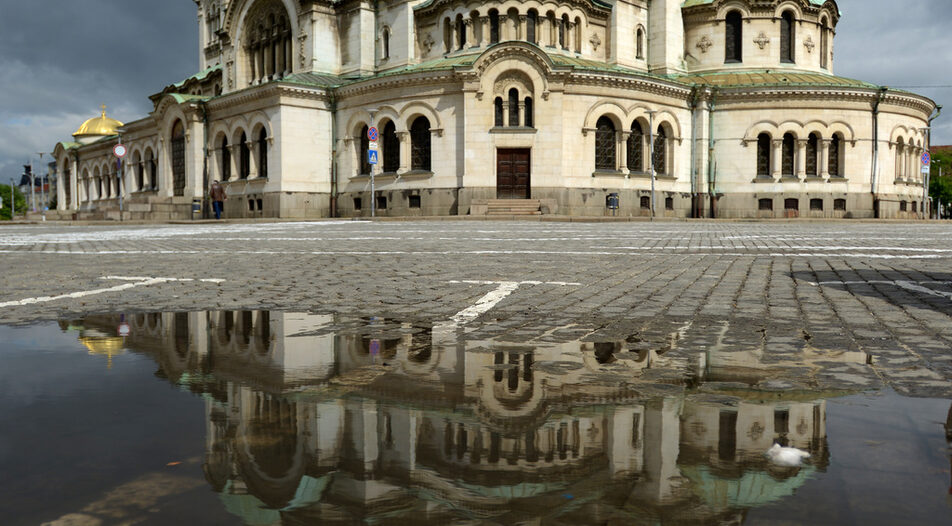An age-old tradition in the Balkans and in particular in Bulgaria is to invite a priest to bless a new apartment, office or factory for good luck and health. An oddity, sure, but nothing particularly out of the ordinary. That is, until one takes into account that any blessing costs a fee, determined by the Bulgarian Orthodox Church (BOC) - and is non-negotiable. The bigger the real estate, the higher it costs to bless it.
BOC has a hard price for everything - christenings, last rites, blessings for good luck or to break a curse, as well as candles or other paraphernalia, practically turning into a corporation that effectively monetizes the minimal amount of donations it can receive. Of course, all of these actions are not viewed as trade operations, or at least the Church claims so, because otherwise it would have to be taxed. And if history has taught us anything, it is that a religious institution dislikes nothing more than the unfaithful or paying taxes.
Herein lies a problem for the BOC. Despite avoiding scrutiny for well over three decades, while benefiting from EU subsidies and state budget injections, nobody knows anything about its financial state. Until recently, it also seemed like nobody cared. However, at the end of 2023, the National Revenue Agency (NRA) launched a financial revision of the Church in order to ascertain obligations relating to corporate tax for the period of 2017-2022.
This is only the second time the government has ever probed into the finances of the holy establishment. The first one took place in 2013 with the goal of establishing obligations for tax on income on natural persons and from employment contracts and the legal relationship equated to them.
Without a shadow of a doubt, such financial revisions of the BOC are much needed. In 2020, the national budget increased the state subsidy to the church 10 times to 26 million levs. The 2024 budget foresees a further increase to 38,4 million levs. Furthermore, in the last three years, the BOC has received a total of 111 million levs from the national agriculture fund. The BOC insures 1,885 people, which would land it amongst the 50 largest employers in the country. Lastly, only within the city of Plovdiv, the Church owns dozens of properties including apartments for rent, trade spaces and arable land, which it rents out, but most of which does not have any rental contracts associated with them.
Financial scrutiny or hostile takeover?
The ruling body of BOC, the Holy Synod, reacted to the revision by the NRA with a 7-page open letter signed by the metropolitan of Melnik and secretary of the Holy Synod Gerasim, in which it determined the actions of the agency as unconstitutional and posing a risk to national security, claiming that the check poses "an irrefutable and unconstitutional attempt to intervene in the internal affairs of the BOC," adding that the financial control literally means an attempt by the state to intervene in the church's internal operations.

The letter, which mixes history, religious elements (like the claim that the BOC has been launched by Jesus Christ himself) and legal matters, effectively claims that the state authorities have no business applying secular rules to the church's operations. Under Bulgarian trade law, however, this is not true - the NRA has the right to tax corporate profits, including those made by organizations of faith, from deals and from renting out movable and immovable properties.
According to Church law professor Dilyan Nikolchev, from a legal and ecclesiastical point of view the position of the BOC "is untenable and deeply wrong as an interpretation." Nikolchev refutes the view of the Synod that the revenue it has received from rents ought not to be taxed, as it is not an income, but an endowment. "Rent suddenly - according to the Synod's understanding - turns into donations from people of faith. The Synod omits the text of Article 19, paragraph 2 of the Constitution, which reads: "The law creates and guarantees to all citizens and legal entities the same legal conditions for economic activity," he says.
According to him, although the Law on Religions outlines the freedom, equality and independence of all religions from the state, religious beliefs are not grounds for refusing to perform the obligations established in the Constitution and religious bodies are legal entities.
Real estate is not an icon
There is a serious reason for the BOC to worry about the government looking into its property portfolio. "Managing the properties of the Plovdiv branch of the BOC is like being the mayor again. There are more than 50 in Plovdiv alone, not to mention the other areas. These properties require management," former mayor of Plovdiv Zdravko Dimitrov told 24 Chasa newspaper last month, shortly after assuming office as manager of the properties of the Plovdiv branch of the BOC. An investigation by Capital weekly showed that rental contracts rarely exist in the property register for properties owned and rented by the Church in the region.
In its statement to the NRA, the Holy Synod states that the NRA cannot audit the BOC's property contracts, as this would amount to an interference with its internal operations: "If the State prevents the Church from using the church property according to its purpose, it prevents the worship itself." According to Nikolchev, however, there are two types of church property. The first - res sacrae - are directly intended for the divine service itself and include such things as the temple, the altar, the antimins, the Gospel, crosses, icons, etc., and can't be audited.
But the second type of property - the res ecclesiastici, which refers to real estate that serves to satisfy the needs of the Church, such as meeting the costs of carrying out the cult, for the maintenance of church members, etc. can be audited by the NRA. The same applies to profits from rents, profits or dividends from participation in commercial companies, income from government subsidies, donations, bequests, etc.
Church entrepreneurship
For an institution that claims to be separate from the nation's economy, the BOC is quite frivolous with the prices of services and products on which it holds a monopoly. For example, the price of candles was raised twice in 2018 and 2022 by 100% with no explanation. In the same period, the services offered by the temples were also raised, a price list for which one could find at the entrance of every temple or church. The amounts of these fees are non-negotiable and can hardly count as donations.

The BOC also boasts some very interesting businesses. The Plovdiv Metropolitanate, for example, runs a candle foundry company called Synodalna Svestholivna Orta Khan. It is the sole provider of candles that are allowed in the 969 Orthodox temples in the largest diocese in the country, but in its latest financial report (from 2017), it declared a revenue of only 25,000 levs and an accumulated loss of 6,000 levs. Since then, the candle foundry has claimed it has not been active, although if one walks past it, they can see that it is operating at full capacity. The only other candle foundry in the country, which is located in the district of Illiantsi in Sofa, has also not submitted any financial information in years, despite holding the monopoly over candle-making in the rest of the country.
Peevski to the rescue?
Auditing the BOC would be an uphill struggle. None of its activities include the issuance of a receipt, and contracts for the rented premises and leases are mostly missing from the official websites. There is also a lack of desire on the part of the BOC to be an active participant in this process, as it shows itself in the letter sent to the NRA.

And this letter seems to be just the beginning of the Church's defense. A few weeks after the start of the second audit in November 2023, several seemingly inexplicable meetings took place between members of the Synod and President Rumen Radev, and then with MRF MPs Delyan Peevski and Yordan Tsonev. Officially, they discussed the state subsidies and the repairs of temples. Having in mind the recent attempt of Magnitsky-sanctioned Peevski to position himself as the leading broker in similar public disputes, the real purpose of the meeting might have a lot more to do with the NRA probe.
Capital weekly approached the Holy Synod with questions regarding the NRA audit, but did not receive any answers. As for the audit itself, its deadline seems unclear, but according to the NRA's response to Capital's questions, it appears that the agency is still collecting the necessary documents needed to carry it out.
An age-old tradition in the Balkans and in particular in Bulgaria is to invite a priest to bless a new apartment, office or factory for good luck and health. An oddity, sure, but nothing particularly out of the ordinary. That is, until one takes into account that any blessing costs a fee, determined by the Bulgarian Orthodox Church (BOC) - and is non-negotiable. The bigger the real estate, the higher it costs to bless it.
BOC has a hard price for everything - christenings, last rites, blessings for good luck or to break a curse, as well as candles or other paraphernalia, practically turning into a corporation that effectively monetizes the minimal amount of donations it can receive. Of course, all of these actions are not viewed as trade operations, or at least the Church claims so, because otherwise it would have to be taxed. And if history has taught us anything, it is that a religious institution dislikes nothing more than the unfaithful or paying taxes.












